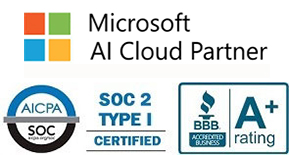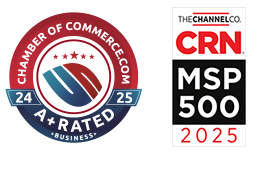IT Consulting | IT Support | Managed Services | New Jersey Computer Support Services

Most people know that growth is a hallmark of a healthy business. However, expansion often entails costly and complex IT overhauls. Many organizations discover that relying on traditional IT outsourcing can impede their adaptability. Managed services provide a proactive alternative that aligns with growth objectives.
This blog will discuss the importance of scalability in IT and compare managed IT services vs. outsourcing your IT. We’ll review the differences in flexibility, cost-efficiency, and risk management between these two approaches.
What Does Scalability Mean in IT Services?
In the realm of IT, scalability refers to the capacity to adjust resources, users, or infrastructure up or down without causing interruptions. To determine the perfect service for your business's scaling requirements, it's beneficial to compare managed IT services vs. outsourcing.
Global IT spending is projected to grow by 9.3% this year. A scalable IT framework enables businesses to adapt to evolving demands without the expense and urgency of last-minute changes. This flexibility offers both technical benefits and a direct positive impact on crucial business outcomes.
-
Cost Control: Scalable IT prevents overspending on unused systems and allows for predictable budgeting.
-
Performance and Uptime: As user load increases, a scalable system maintains performance, ensuring high availability and a consistent user experience.
-
Customer Experience: Reliable systems lead to satisfied customers who can depend on your services without interruption.
-
Innovation Speed: A flexible infrastructure allows businesses to test and deploy new features and services quickly.
The Traditional IT Outsourcing Model: Limited Flexibility
Legacy IT outsourcing typically operates on fixed-term contracts with rigid Service Level Agreements (SLAs). This model is often reactive, addressing problems as they arise. While it can handle day-to-day IT tasks, it struggles to support dynamic business growth.
Common pain points of the traditional model include:
-
Long Lead Times: Adding or removing resources often requires time-consuming contract renegotiations.
-
Lack of Visibility: Businesses may have little real-time insight into system performance or usage.
-
Cost Inefficiencies: Fixed contracts mean you pay for capacity you might not need, or face high fees for exceeding your limits.
This rigid structure makes it difficult for businesses to pivot, innovate, or respond to market changes as quickly as needed.
How Managed Services Prepare for Growth
In contrast, Managed Service Providers (MSPs) offer continuous monitoring, proactive maintenance, and flexible resource allocation. This model is built for on-demand scalability, both technically and operationally.
An MSP is a strategic partner, aligning IT strategy with your business goals. They provide the technology and expertise to support growth, rather than just fixing what's broken. By using tools like cloud infrastructure and virtual CIO services, MSPs ensure your IT environment is not just stable, but also ready for future challenges.
Cost Efficiency and ROI: Scaling Without Waste
The financial differences between managed IT services vs. outsourcing become clear when scaling.
-
Traditional Outsourcing: It's not just the high upfront costs for new hardware or software to consider with the traditional model. There are also administrative burdens, such as renegotiating contracts.
-
Managed Services: MSPs typically offer a pay-as-you-grow model. This means you only pay for the resources you use, allowing for more efficient capital allocation and a stronger return on investment (ROI).
With an MSP, you can scale resources up during peak periods and down during quieter times, without sacrificing performance.
Business Continuity and Risk Reduction
A proactive MSP helps manage the challenges that come with a growing business, such as cybersecurity threats or compliance requirements.
MSPs guarantee business continuity and reduce risk by implementing scalable security and data protection measures, including:
-
Automated Backups and Redundancy: Keeping your data safe and recoverable in the event of an outage or disaster.
-
Cybersecurity Scaling: As your business grows, so does your attack surface. MSPs provide scalable threat monitoring, endpoint protection, and compliance management to keep your systems secure.
This proactive approach to security and compliance is at the core of the managed services model and is beneficial for any growing business.
Ultimately, when deciding between managed IT services and outsourcing, consider whether a proactive or reactive IT strategy best suits your business needs.
Gear Up Your Business for Growth
At Integrated Computer Services, we know that the choice between managed IT services vs. outsourcing your IT involves many factors. Choosing the right IT service model is a critical business decision, after all.
With our managed IT services, we provide the flexibility, cost-efficiency, and proactive support necessary to scale your operations smoothly and securely.
Partner with us today.SCHEDULE AN IT Assessment
About Us:
- 150+ 5-Star Google Rated IT Firm
- Microsoft Certified Cloud AI Partner
- SOC II Certified Managed Service Provider
- Better Business Bureau A+ Rated






